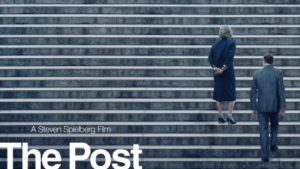A package in hand, the young woman makes her way into The Washington Post newsroom. She wanders a bit, looks around uncertainly, then fixes her attention on a man who is among the many staffers who are banging away at their typewriters.
“Are you someone important?” she asks, interrupting him in the midst of his writing.

“I’m a general assignment reporter,” he responds, a blend of befuddlement and apology.
The woman (portrayed, hippie-like, by Sasha Spielberg, director Steven Spielberg’s daughter) processes the unfamiliar words. In an instant, she seems to conclude good enough, as she lays the package on his typewriter.
Inside is a Thom McAn shoebox stuffed with a portion of the Pentagon Papers. The moment, about a half-hour into “The Post,” marks a turning point in the Post’s scrambling catch-up to The New York Times, which had just broken the untold (and scandalous) story of the country’s involvement in the Vietnam War.
A Timeless Core Tension: Free Press vs. National Security
There were many terrific moments in the film that contributed to a production that I wholeheartedly recommend. My 20-year career as a journalist probably explains why I got misty-eyed at more than a few moments—yes, even the sight of a printing press cranking out the Post’s next edition. But this is a movie for any American who cares about our nation’s past, present and future.
Its core tension is timeless: a free press versus government claims to national security interests. And those opposing forces are especially timely in this age of Trump, when our own President is out-Nixon-ing Richard Nixon for his derision of and attacks on the media.
Making the experience this morning all the more enjoyable was that it came as a special screening at the Lake Theatre with about 40 students from Oak Park and River Forest High School. A grateful shout-out to Liz Fox, an OPRF English teacher and adviser to the school newspaper, The Trapeze, who organized the event and extended the invitation to me.
Longtime Washington Post Journalist Fields Questions

Capping the moment was the presence of Jackie Spinner, a reporter for The Washington Post from 1995 to 2009 and currently a journalism professor at Columbia College Chicago. After the movie, Jackie shared her observations of the movie, reflected on her experiences at the Post, and fielded thoughtful questions from students.
Among her accomplishments, Jackie spent a significant amount of time as a foreign correspondent, including serving as a war reporter. She is the author of “Tell Them I Didn’t Cry: A Young Journalist’s Story of Joy, Loss and Survival in Iraq.”
As Trump relentlessly wages war on the media (most recently illustrated by his ‘Fake News Awards’), there is a clear answer that anyone in the media should feel empowered to give, without apology or hesitation, when that question comes: “Are you someone important?”
Yes! And, very likely, more than you’ll ever know.
Related Posts:
7 Take-Aways From the Trump Rally in Chicago
In the Wake of NBC’s Brian Williams’ Fall From Grace, Apologists Creep Out of the Woodwork
